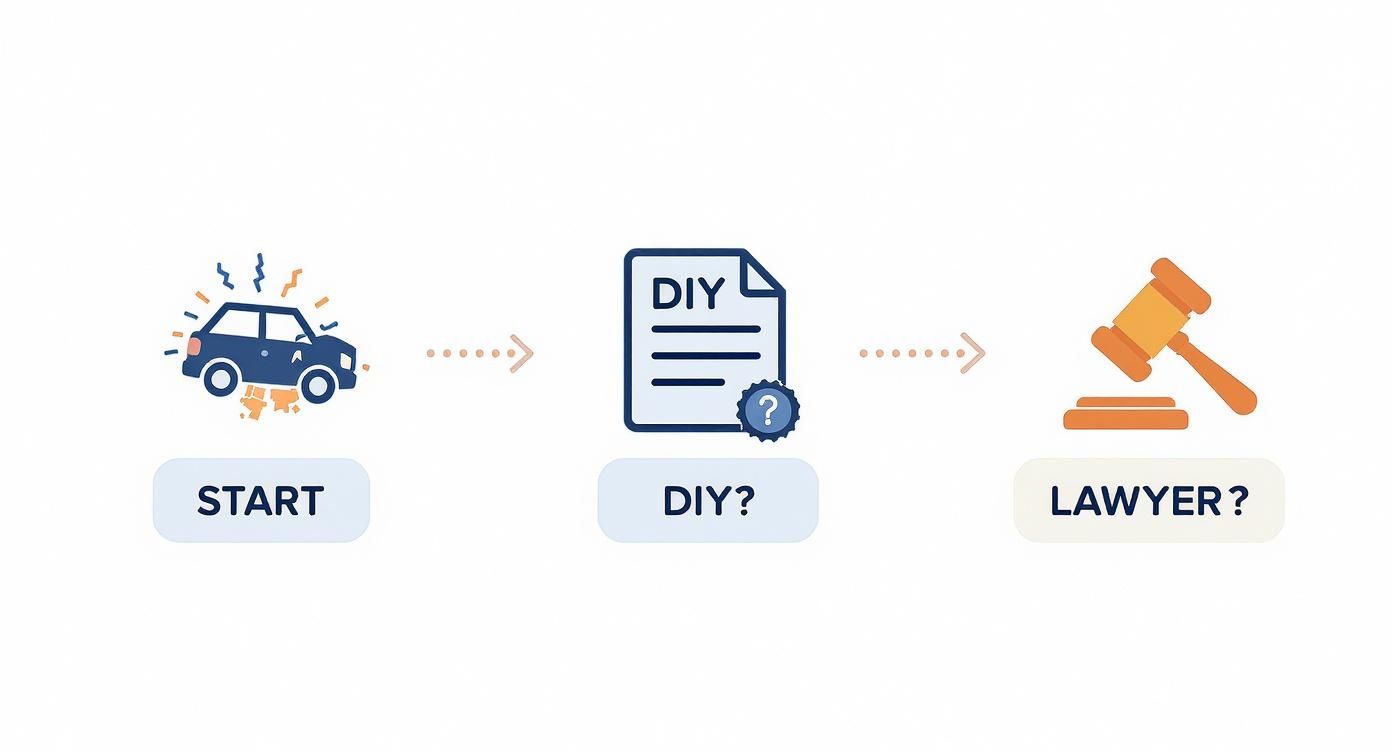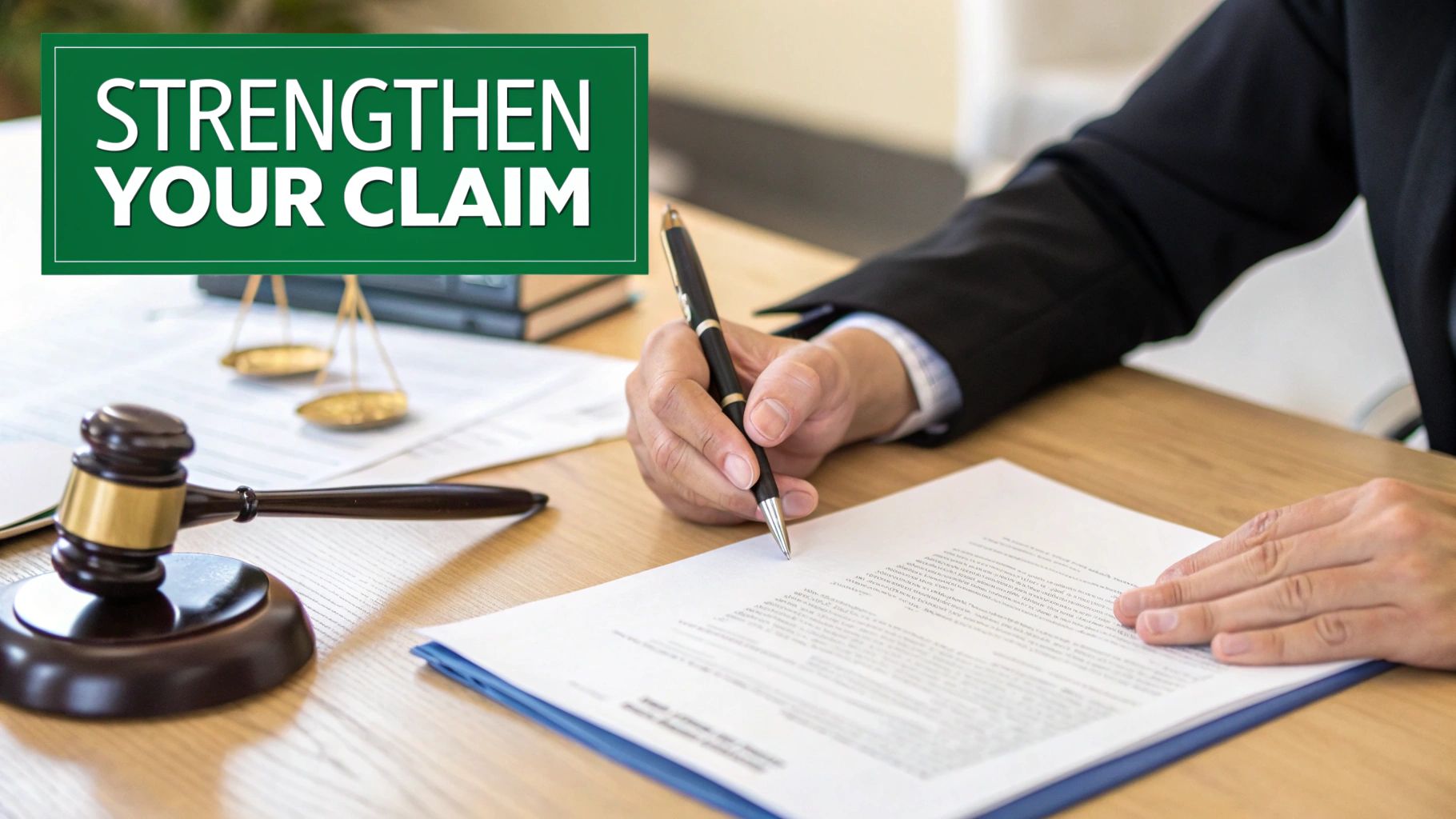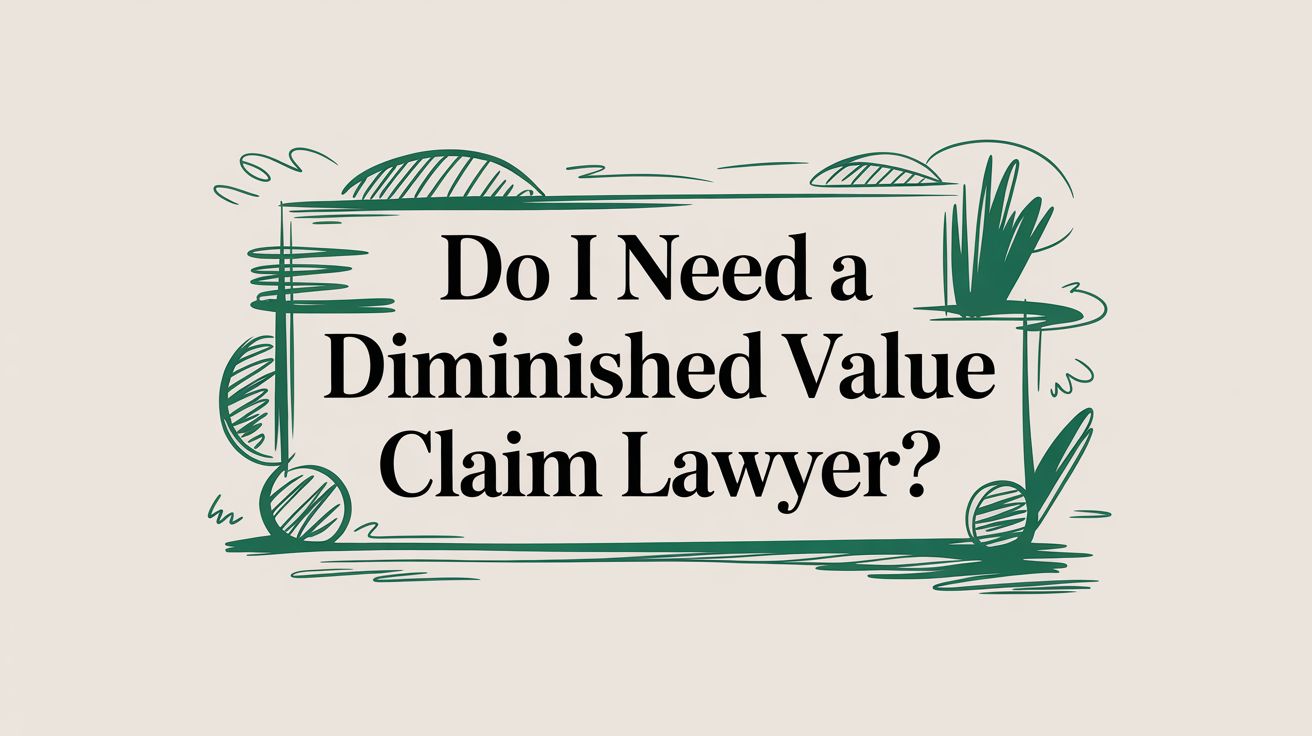After a car accident, you know the insurance company should pay for repairs. But what about the permanent loss in your car’s resale value? This is called diminished value, and getting fair compensation can be a challenge. While a solid appraisal report is often enough, sometimes you need a diminished value claim lawyer to level the playing field.
Knowing when to handle a claim yourself versus when to hire an attorney is key to recovering the money you’re rightfully owed. This guide will help you decide the best path forward for your situation.
When to Hire a Diminished Value Claim Lawyer
A diminished value claim lawyer becomes a critical asset when your claim gets complicated, your vehicle has a high value, or the insurer simply refuses to pay a fair amount. While a certified appraisal is your first line of defense, a lawyer provides the legal leverage you need to win tougher battles.
High-Value and Specialty Vehicles
If you own a luxury car, exotic vehicle, or a classic, the financial loss after an accident can be substantial. These vehicles often lose a much larger percentage of their value, and insurance companies are notorious for fighting these high-dollar claims aggressively.
An experienced attorney understands the unique market factors that impact these vehicles’ values and can argue your case effectively. They help ensure you don’t get short-changed by thousands of dollars. You can learn more about these factors in our guide on how much an accident will devalue a car.
This quick decision tree can help you see the path forward—whether it’s a DIY claim or time to lawyer up.

As you can see, a certified appraisal is often enough. But for severe damage, claim denials, or high-end vehicles, a lawyer is your best bet.
Historically, hiring an attorney for these claims was less common because the amounts were often too small. That’s changing. When the losses are significant, good legal help is invaluable. The same logic often applies to deciding when to hire a personal injury lawyer, as the core principles are very similar.
Lawyer vs. DIY Claim Scenarios
Still unsure? This table breaks down common scenarios to help you decide on the best approach for your specific situation.
| Situation | Recommended Approach | Why |
|---|---|---|
| Minor to moderate damage on a standard vehicle | DIY with a Certified Appraisal | A SnapClaim appraisal provides the proof you need, and the claim amount is manageable for self-negotiation. |
| Your claim is flat-out denied | Hire a Lawyer | A denial means the insurer is digging in. You’ll need legal muscle to force them to reconsider. |
| Luxury, exotic, or classic car | Hire a Lawyer | The financial stakes are too high, and insurers are most aggressive with these high-value claims. |
| Insurer makes a very low “final” offer | DIY with a Certified Appraisal | Use your appraisal to counter their offer. If they still won’t budge, then it’s time to consider a lawyer. |
| Severe structural or frame damage | Hire a Lawyer | The diminished value will be substantial, and the insurer will fight hard to minimize the payout. |
Ultimately, the goal is to recover what you’re owed. For many, a strong appraisal is enough. For others, a lawyer is the only way to get a fair shake.
Finding and Choosing the Right Attorney
When you decide to hire a lawyer, it’s crucial to find the right one. Not just any attorney will do. Many people mistakenly think a general personal injury lawyer is the right fit, but they often lack the specific knowledge needed to win a battle over your car’s lost value.
You need a specialist—a true diminished value professional.
Your search should go beyond a fancy website or a catchy commercial. A great starting point is your state bar association’s directory, which often lets you filter attorneys by practice area. You can also check legal directories like Avvo or Lawyers.com to read client reviews. Focus on lawyers who explicitly list “diminished value” or “automotive property damage claims” as a core part of their practice.

Vetting Potential Candidates
Once you have a shortlist, it’s time to dig deeper. Your goal is simple: find a diminished value claim lawyer with a proven track record of winning these specific cases.
Any seasoned lawyer in this field knows a strong claim is built on irrefutable proof. They will almost certainly tell you that the first step is getting an independent, third-party appraisal to document your vehicle’s loss in value. This appraisal is the foundation of your case, giving your attorney the hard data needed to build a powerful argument. You can learn more about finding a qualified diminished value appraiser near you and see what makes their work so effective.
Key Qualities to Look For
As you speak with potential lawyers, focus on these three non-negotiables:
- Niche Experience: Ask them directly about their history with diminished value cases. How many have they handled? What kind of results did they achieve for their clients?
- Deep State-Specific Knowledge: Diminished value laws vary significantly from one state to the next. You need someone who understands your state’s specific rules and legal precedents.
- A Clear Fee Structure: They should clearly explain how they get paid, which is usually a contingency fee (a percentage of the settlement). Ensure there are no hidden costs.
A good attorney doesn’t just take your case—they become your partner. They’ll use expert evidence to craft a compelling argument and fight for every dollar you’re rightfully owed.
What to Ask a Lawyer During Your Consultation

Your first meeting is your chance to interview a potential diminished value claim lawyer and confirm they have the specialized skills to win. Going in prepared with the right questions helps you separate the true experts from the generalists.
Think of it like this: you wouldn’t hire a plumber to rewire your house. Vague answers are a red flag. Confident, specific responses show they’ve been in these trenches before and know exactly how to navigate them.
Key Questions to Uncover Real Expertise
Show up to the consultation ready to ask pointed questions that test their specific knowledge. This is how you’ll know if they truly understand the unique challenges of diminished value claims.
Here’s what you should ask:
- How do you counter the insurer’s 17c formula? This is a common insurance tactic used to create a lowball offer. A seasoned lawyer will have a ready, detailed answer explaining how they dismantle its validity.
- What is your process for using an independent appraisal to build a case? A professional appraisal is your most powerful evidence. A good attorney should see it as the foundation of their legal argument.
- How many diminished value cases have you successfully settled or won in the past year? Their recent track record is the best indicator of how well they can handle your claim.
- What is your communication style with clients? Ask how often you can expect updates and who your primary point of contact will be, so you’re not left in the dark.
A great lawyer won’t just file paperwork; they will build a narrative around your loss. They use the data from a certified appraisal to tell a compelling story about your vehicle’s lost market value, making it difficult for the insurer to ignore.
By getting solid answers to these questions, you can confidently pick an attorney who is truly equipped to fight for the compensation you deserve. To get a better handle on the process from the start, check out our guide on how to file a diminished value claim.
Understanding Legal Fees for Diminished Value Claims
One of the biggest concerns people have about legal action is the cost. The good news is that hiring a diminished value claim lawyer is more affordable than you might think. You don’t need a massive upfront payment to get started.
Most attorneys in this field work on a contingency fee basis. In simple terms, this is a “no-win, no-fee” arrangement where the lawyer’s payment is a percentage of the money they recover for you.
How Contingency Fees Work
This payment model aligns your lawyer’s goals with yours. They only get paid if you win, which motivates them to fight for the highest possible settlement. It makes top-tier legal help accessible to anyone, regardless of their financial situation.
Typically, contingency fees range from 25% to 40% of the recovered amount. The exact percentage usually depends on the case’s complexity. A claim that settles quickly will be on the lower end, while one that goes to court will be higher.
A contingency fee means your lawyer has skin in the game. They take on the financial risk, freeing you to pursue your claim without worrying about hourly bills.
What About Other Costs?
The contingency fee covers the lawyer’s time, but there can be other case-related expenses. It’s crucial to get a clear picture of these during your initial consultation.
- Appraisal Fees: A professional appraisal is the backbone of your claim. This is often an upfront cost you’ll cover, though some firms may advance it and get reimbursed from the settlement.
- Court Filing Fees: If a lawsuit is necessary, there are standard fees for filing documents with the court.
- Expert Witness Fees: In complex cases, another expert might be needed to testify, which comes with its own fee.
Always ask for a complete breakdown of potential costs before you sign any agreement. A reputable lawyer will be transparent and ensure you don’t face any surprises.
How a Lawyer Strengthens Your Diminished Value Claim
So, what does a diminished value claim lawyer do that you can’t? It comes down to leveling the playing field. You are up against a massive insurance company with departments dedicated to minimizing payouts. An experienced attorney turns a stressful, one-sided fight into a professional negotiation.
They handle the entire process, including the complex legal paperwork, drafting powerful demand letters citing state laws, and managing all communication with the adjuster. This protects you from the intimidation tactics insurers often use to wear claimants down.

From Appraisal Data to Legal Argument
Where an attorney truly excels is in expert negotiation. They know exactly how to dismantle an insurer’s lowball arguments, whether it’s a flawed formula like 17c or a baseless claim that repairs restored your car’s full value.
A skilled lawyer takes a data-backed appraisal report and makes it the undeniable foundation of their case. A SnapClaim report gives an attorney the hard market data they need to prove your financial loss and build a logical, fact-based argument that forces the insurance company to negotiate in good faith.
By combining a certified appraisal with legal expertise, your claim shifts from a simple request to a formal demand for fair compensation, backed by credible evidence and the threat of litigation.
Taking the Fight to the Insurer
While more people are tackling claims on their own, legal muscle becomes essential when insurers refuse to cooperate. You can get more perspective on this trend from consumer resources like navigating diminished value claims on Lawyer-Monthly.com.
Ultimately, hiring a lawyer sends a clear message: you are serious about recovering what you’re owed. That pressure alone is often enough to bring a stubborn adjuster back to the table with a fair offer, helping you get the full compensation your vehicle’s lost value warrants.
Frequently Asked Questions (FAQ)
Can I claim diminished value if the accident wasn’t my fault?
Yes, absolutely. In most states, you can only file a diminished value claim against the at-fault driver’s insurance company. This is known as a third-party claim. You cannot file this type of claim against your own insurance policy.
Is hiring a lawyer worth it for a smaller diminished value claim?
For smaller claims, typically under $2,000, legal fees might consume a large portion of your recovery. In these cases, it’s often more cost-effective to negotiate directly with the insurer using a strong, data-backed report from SnapClaim. A lawyer becomes more valuable as the amount of diminished value increases.
What evidence do I need to give my lawyer?
To help your lawyer build the strongest case, gather all relevant documents beforehand. This includes the police report, repair estimates and final invoices, photos of the damage, and any correspondence with the insurance company. Most importantly, provide them with your certified SnapClaim appraisal report, which serves as the core evidence of your loss.
What if I already accepted the repair check from the insurance company?
Accepting a check for the cost of repairs does not prevent you from filing a diminished value claim. The repair payment and the diminished value settlement are two separate parts of your overall property damage claim. You are still entitled to pursue compensation for your vehicle’s loss in market value after the repairs are completed.
A strong claim starts with strong evidence. A SnapClaim appraisal provides the data-backed proof you need to negotiate effectively, whether you do it yourself or with a diminished value claim lawyer.
SnapClaim also offers a Money-Back Guarantee for your peace of mind. If your insurance recovery from the claim is less than $1,000, SnapClaim refunds the full appraisal fee—guaranteed.
About SnapClaim
SnapClaim is a premier provider of expert diminished value and total loss appraisals. Our mission is to equip vehicle owners with clear, data-driven evidence to recover the full financial loss after an accident. Using advanced market analysis and industry expertise, we deliver accurate, defensible reports that help you negotiate confidently with insurance companies.
With a strong commitment to transparency and customer success, SnapClaim streamlines the claim process so you receive the compensation you rightfully deserve. Thousands of reports have been delivered to vehicle owners and law firms nationwide, with an average of $6,000+ in additional recovery per claim.
Why Trust This Guide
This guide was reviewed and verified by SnapClaim’s auto appraisers, who specialize in diminished value and total loss disputes.
Our team continually updates every article to reflect current insurer guidelines, valuation standards, and court-accepted appraisal practices, ensuring that you’re relying on information trusted by professionals nationwide.
Get Started Today
Whether you’re challenging a low total loss settlement or proving your vehicle’s post-repair loss in value, SnapClaim makes it simple to take the next step.
Generate a free diminished value or total loss estimate in minutes and see how much compensation you may be owed.
👉 Get your free estimate today




